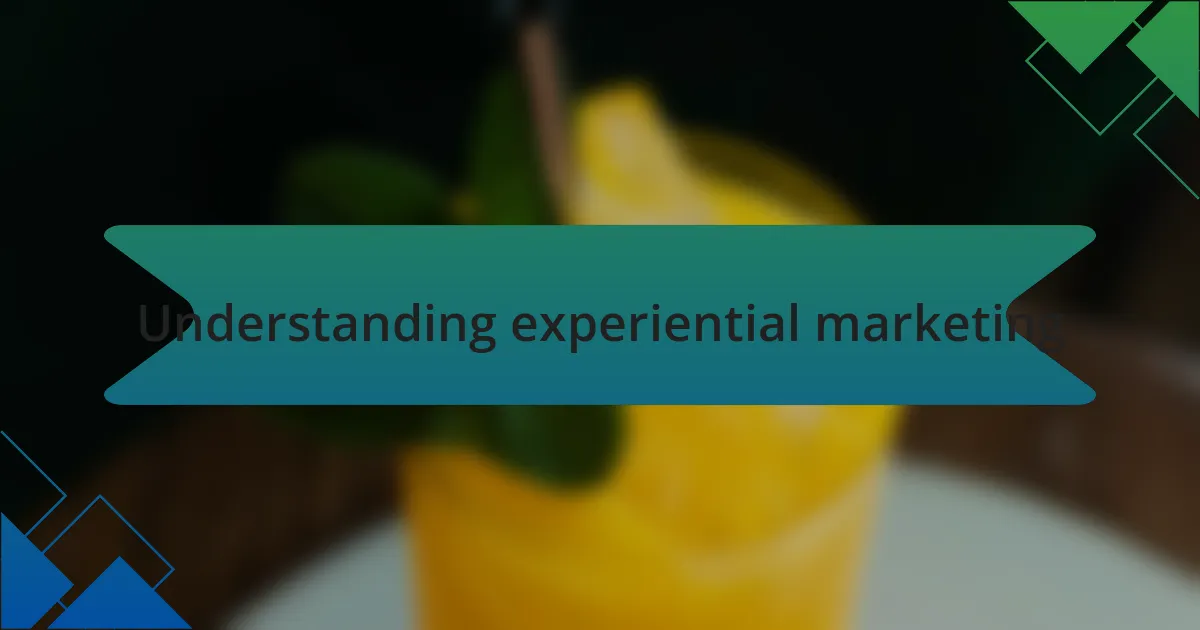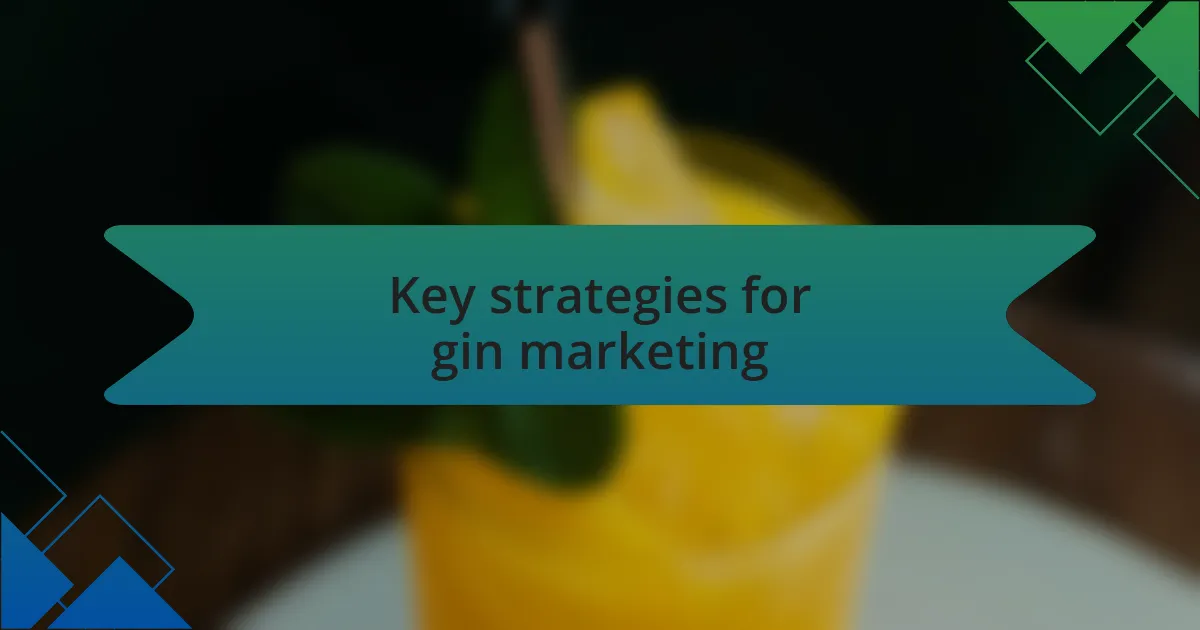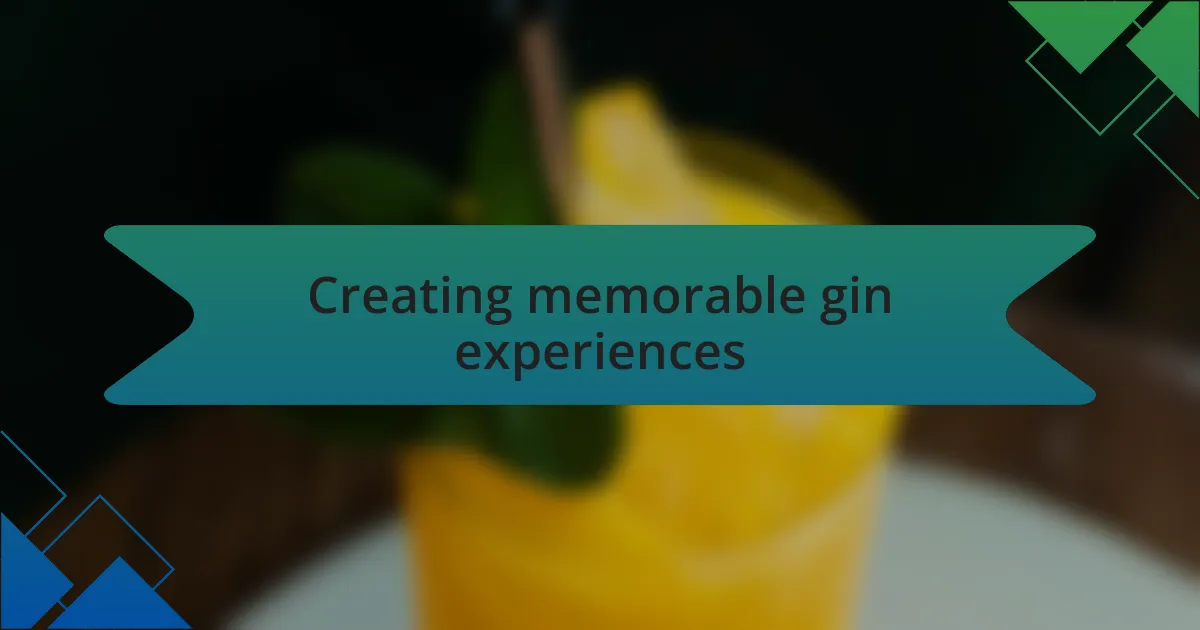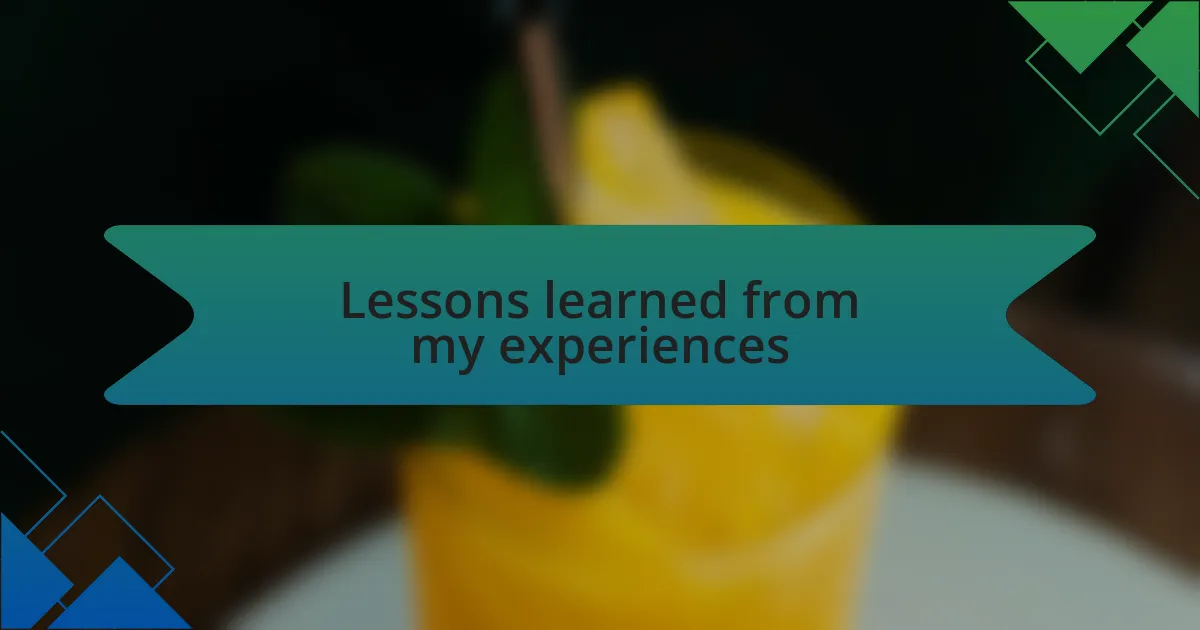Key takeaways:
- Experiential marketing creates memorable, immersive experiences that engage consumers on a personal level, fostering deeper brand connections.
- Key strategies for gin marketing include hosting interactive events, leveraging social media for engagement, and collaborating with local businesses to enhance brand experiences.
- Mixing education with entertainment during tastings and workshops elevates consumer connection and appreciation for the product.
- Storytelling and genuine interactions are essential for creating deeper connections among attendees at experiential events.

Understanding experiential marketing
Experiential marketing is all about creating memorable experiences that resonate personally with consumers. I remember attending an immersive gin-tasting event where each sip transported me to the beautiful landscapes of the distillery’s origin. It was more than just tasting; it was about feeling connected to the product and the story behind it. How often do we purchase something simply because we’re captivated by the experience surrounding it?
At its core, experiential marketing engages the senses and emotions, making it a powerful tool for brands. I’ve noticed that when brands focus on crafting unique experiences, they foster deeper relationships with their audience. Think about when you last participated in an interactive event or workshop—didn’t it stick in your mind far longer than any advertisement could? That’s the magic of experiential marketing; it transcends traditional advertising to create genuine connections.
The beauty of experiential marketing lies in its ability to invite consumers to actively participate in the brand narrative. I once joined a gin-brewing class that not only taught me about the gin-making process but also how to appreciate the subtleties of different flavors. This hands-on approach opened my eyes to the brand’s craftsmanship. How many other brands can claim they’ve inspired such personal investment and excitement? It’s these insights that underline the importance of experiential marketing in creating lasting impressions.

Key strategies for gin marketing
To effectively market gin, one key strategy involves hosting engaging events that encourage interaction. For instance, I once attended a gin festival where each booth represented a different distillery, offering not just tastings but also personal stories from the distillers. This approach transformed a simple tasting into an unforgettable experience—who wouldn’t want to share a drink with the person who crafted it?
Another strategy is to leverage social media to create buzz around unique gin flavors and limited-edition releases. I remember when a brand I follow launched a series of visually stunning cocktails showcasing their latest gin. They encouraged followers to share their own creations, sparking a conversation that drew in new audiences eager to participate. This narrative makes consumers feel like part of the brand’s journey, don’t you think?
Collaborating with local businesses can also enhance the marketing impact. I recently visited a pop-up cocktail bar that featured a particular gin brand paired with artisanal cheeses crafted by a nearby producer. The synergy created a memorable evening that left customers talking about both brands long after they left. Isn’t that the goal? When brands come together, they forge richer experiences that resonate more deeply with consumers.

Creating memorable gin experiences
Creating memorable experiences around gin often involves immersive tastings that engage the senses. I recall a time when I attended a guided gin tasting where the host invited us to explore the aromas of various botanicals before sampling the drinks. This focus on sensory engagement made each sip feel like a discovery, fostering a deeper connection to the gin and its story. Have you ever felt more connected to a drink because of how you experienced it? That’s the magic of truly memorable moments.
Mixing education with entertainment can also elevate the experience. At a recent gin workshop, I learned how to craft cocktails using my favorite gin while enjoying stories about its origins from the mixologist. It was not just about the drinks; it was about understanding the craft behind them and the passion that went into their creation. This connection fueled my appreciation for the brand, making each cocktail I served at home have a personal touch. Isn’t it incredible how a little knowledge can transform a mere beverage into a cherished experience?
Lastly, themed events can create lasting memories, too. I once participated in a speakeasy-style gin night that encouraged guests to dress in period attire, enhancing the atmosphere. The combination of classic cocktails and storytelling pulled me back in time, forging unforgettable connections with fellow guests. Experiences like this show how creating a well-rounded theme can transport participants, leaving them with more than just a taste to remember—it gives them stories to share. How can we leverage such themes in our future endeavors? It’s all about creating those sparks that linger long after the night is over.

Lessons learned from my experiences
Reflecting on my journey, one key lesson emerged: the power of storytelling in experiential marketing. I remember hosting an intimate gin event where I shared the history of the distillery behind one of my favorite brands. Participants didn’t just drink—they became part of the narrative, feeling a sense of connection with the gin long after the last glass was poured. How often do stories enhance our appreciation of the simplest pleasures in life?
Another pivotal insight for me was the importance of fostering genuine interactions among attendees. During a collaborative tasting session, I noticed how conversations sparked around shared experiences. It was as if the gin acted as a bridge, connecting people who might never have met otherwise. This engagement added depth to the event, transforming casual sips into meaningful connections. Isn’t it interesting how a drink can catalyze new friendships?
Lastly, flexibility proved to be invaluable in shaping memorable events. At a pop-up gin bar, I adapted the menu based on immediate feedback from guests, introducing flavor pairings on the spot. This responsiveness created an atmosphere where everyone felt included, nurturing a sense of community. Have you ever felt the magic of a gathering that seemed to evolve in real-time, reflecting the desires and tastes of its participants? It’s a lesson I hold dearly: when we listen and adapt, the experience blossoms beautifully.